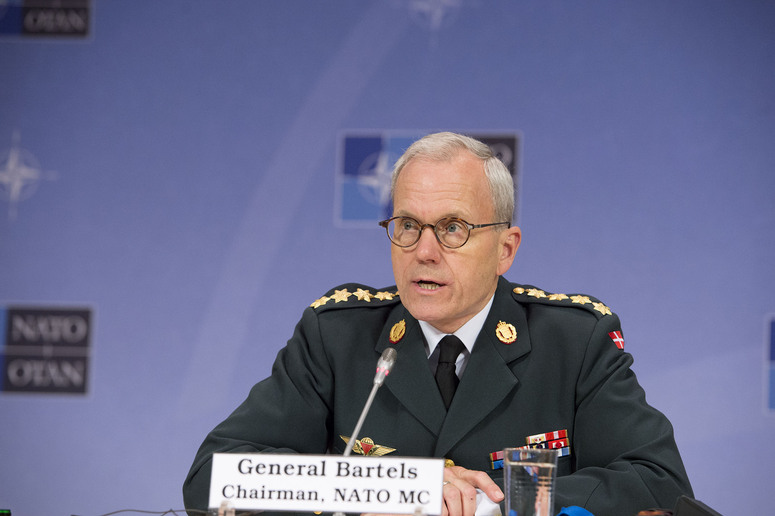Opening statement by the Chairman of the NATO Military Committee
Knud Bartels, at the joint press point following the 171st NATO Chiefs of Defence meeting

Ladies and gentlemen,
Good afternoon. Let me start this press conference by giving you an overview of the outcome of the second NATO Chiefs of Defence meeting of 2014. Given the proximity of the Summit and preceding Ministerial meetings, the significance of recent events in Ukraine and the shift in NATO’s posture from being engaged in operations to being prepared for operations, this gathering has been extremely important for us. It has allowed the Chiefs of Defence to share their perspectives and provide clear and unequivocal Military Committee advice to Ministers and Heads of State and Government on key Summit issues.
Our view is that the global security situation is becoming increasingly unpredictable, unstable and interconnected, as demonstrated by the unilateral change of borders under use of force and the following unrest in Ukraine. Recent events there, in Syria and the Sahel region, to name but a few, have reinforced the need for NATO to be ready for a wide range of potential threats both near and far abroad. Be these threats conventional or asymmetrical, the days of binary and traditional solutions are gone. We cannot set the clock back. We are facing a new security architecture which we need to address. The challenges are global and multifaceted, non-traditional, and we must address them as such.
NATO’s credibility and thereby its capacity for deterrence, collective defence and crisis management is dependent on a demonstrable capability, readiness and usability of our military force. We need to ensure coherence between the available forces and how we deploy them, in other words we need to ensure that readiness translates into responsiveness. For this reason, NATO Chiefs of Defence agree to reinforce the Education, Training, Exercises and Evaluation programme. They also agree that NATO and its member nations need to address capability shortfalls, training and readiness through investment, activity and cooperation. Certainly, investments cost money but, as the NATO Secretary General has said, the price for insecurity is much more expensive and we all agree to that.
From a military perspective, Partners have a great deal to offer and we should continue to focus on strengthening relationships and interoperability, especially with those Partners who express their will to operate alongside NATO. Indeed, we have had extensive discussions with our partners in different formats – ISAF, Resolute Support – and with Georgia and Ukraine, and we all agreed on the benefit of our military-to-military cooperation in terms of interoperability and mutual understanding. Of course, we need to work hard to maintaining these relationships in the coming years but I am confident we will reach this goal.
Now, I want to hand the floor over to General Breedlove and General Paloméros, who will give you an update on Operational and Transformation issues respectively. Phil, if you want to start...
